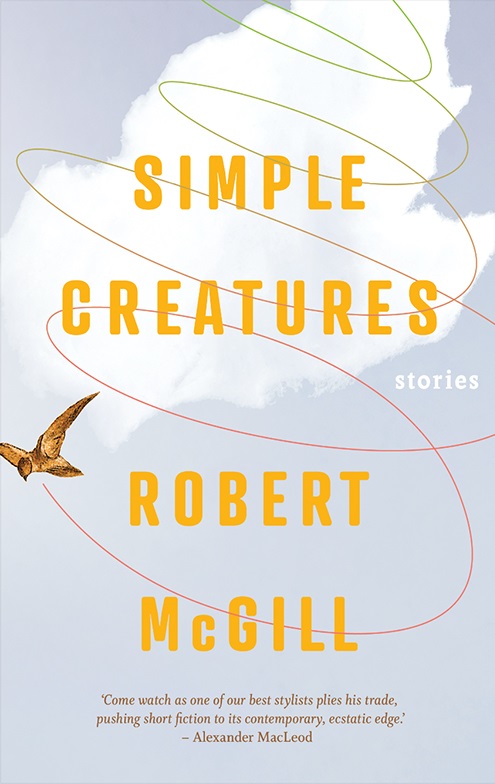Robert McGill’s Simple Creatures features characters looking to simplify their lives.
In today’s fast-paced and complicated world, who hasn’t thought about making efforts to make life simpler?
Robert McGill, acting chair of the Faculty of Arts & Science’s Department of English, explores the heartaches and joys of people seeking to uncomplicate their lives in his debut short story collection released this month, Simple Creatures.
McGill’s characters include a teenager who wants to live among a community of Bigfoot that he believes he’s found in the woods; a widow of an endocrinologist who adopts a chimpanzee from his lab; a divorcée seeking to discover the identity of a mysterious author who’s made a viral environmental pledge; and an amateur hockey player who’s struggling with the fact that his name is Leo Gretzky.

The stories all have an element of humour but feature characters who are feeling overwhelmed by the complications of their contemporary lives.
“I think many people move on a pendulum between wanting to acquire things and wanting to divest themselves of what they have acquired, either voluntarily or involuntarily, consciously or unconsciously,” says McGill.
“As human beings, we want to avoid situations of scarcity. We want to make sure we're warm enough, have enough to eat and have at hand the tools and resources we need. Following that impulse, we often find that things have become too overwhelming, quantitatively, emotionally, psychologically and we want something pure, more minimalist, a life that’s easier to deal with, and so we start to move in the other direction.”
For some of the book’s characters, that movement comes in such forms as choosing to move into a beach hut, taking a vow of silence, deciding to buy only used goods, and fully disconnecting from the internet.
“With these characters, there's repeatedly this drive towards simplifying, and in some cases, a kind of minimalism. But I'm interested less in the solutions they explore than in their motivations for trying out these solutions. I'm interested in the consequences for their lives, with particular attention to their interpersonal relationships.”
One story with a particularly catchy title is “Your ASMR Boyfriend Addresses the Climate Crisis.”
Autonomous sensory meridian response or ASMR is a physical and psychological experience that creates pleasurable and relaxing sensations in response to specific visual and auditory stimuli.
In “ASMR boyfriend videos,” individuals watch social media clips of virtual boyfriends, where whispered affirmations, gentle sounds and comforting conversations evoke feelings of connection and companionship.
A short story often doesn't come with a back cover blurb. There’s room for a more radical kind of surprise that’s part of the reading experience.
“Anytime I mention the title, people get excited and intrigued, but not always for the same reasons,” says McGill.

“Several years ago, I read a New York Times article about the phenomenon of ASMR boyfriends. This was a bizarre and wonderful concept to me, so I immediately began intensive research via YouTube into the ASMR boyfriend phenomenon, and quickly saw the possibility for a short story in the form of a series of monologues on a YouTube channel.”
Many of Simple Creatures’ stories were written during the COVID pandemic. With the world in a state of turmoil and uncertainty, writing another novel just didn’t feel right to McGill.
“In spring of 2020, it was hard to imagine committing to a novel that would have relevance for people two years on or five years on because the world seemed to be changing so radically and so quickly that it was hard to know how one would be able to write about the world in a way that would speak to future audiences,” he says.
“Short stories were a way to engage with various contemporary issues and life experiences without committing to that multi-year project. They were also a way for me to try new things.”
That curiosity was further fueled by his teaching a class on the short story.
“I wanted to introduce my students to the vast array of possibilities in terms of voice and form and narrative structure in that form,” he says. “And so talking about those things with my students and encouraging them to see all the possibilities fed into my own desire to explore new areas as a writer.”
With this mindset, McGill enjoyed the creative freedom.
“A short story can be anything,” he says. “It doesn't have the same expectation of convention that a novel does. Of course, a novel can be experimental and radically different from other novels, but the expectations that come with a narrative of a certain length means that once you start writing a novel, you're locked into a set of readerly expectations that you fail to meet at your peril.”
In contrast, he believes readers go into a short story with a greater willingness to be challenged and surprised. “Readers tolerate and even welcome radical diversions from convention with regard to something like narrative structure or a point of view,” he says.
Plus, with their short length, if a particular story doesn’t resonate, there’s always the next one.
Another feature McGill loves about a short story collection — no spoilers.
“A short story often doesn't come with a back cover blurb. There’s room for a more radical kind of surprise that’s part of the reading experience.”


